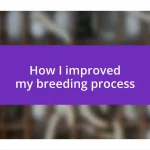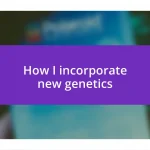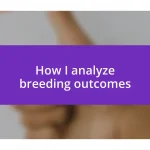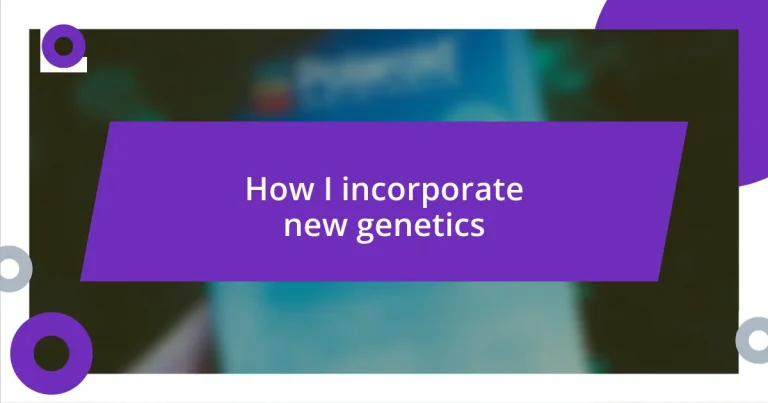Key takeaways:
- CRISPR technology and genetic mapping are revolutionizing agriculture and medicine, offering new hope for treating diseases and enhancing food security.
- Genetic testing options empower individuals to understand their health risks, leading to informed decisions about ancestry, health screenings, and personalized medicine.
- Adapting to new genetic knowledge fosters proactive health management, enabling individuals to make lifestyle changes that resonate with their genetic predispositions and enhance overall well-being.
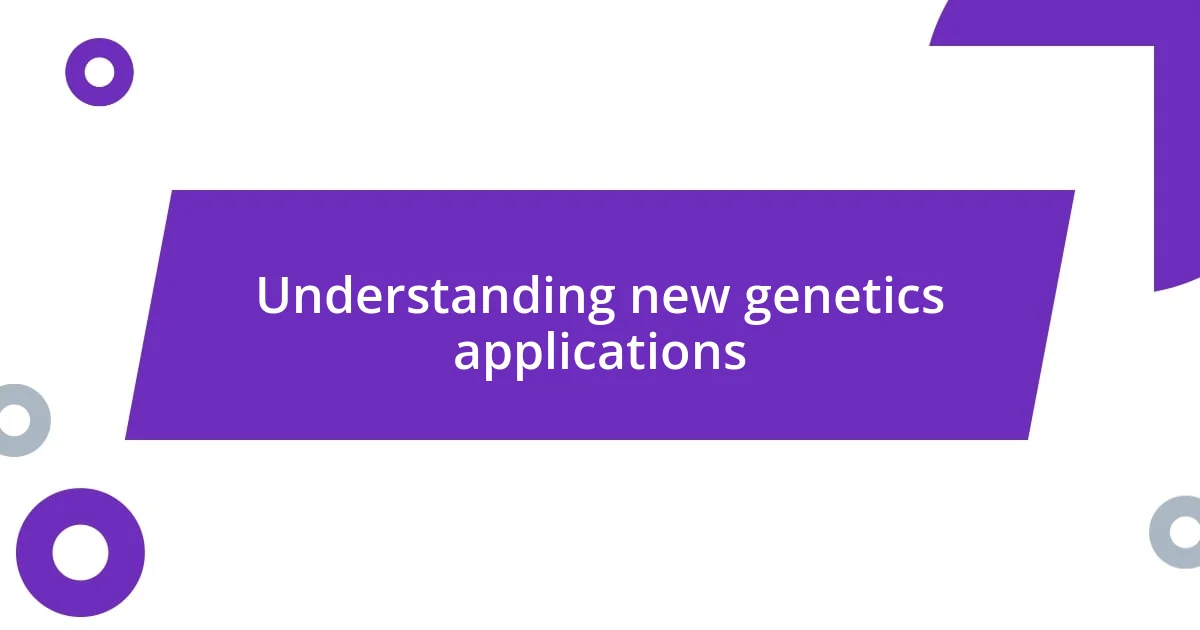
Understanding new genetics applications
New genetics applications are transforming fields ranging from medicine to agriculture. When I first learned about CRISPR technology, I was blown away by the idea that we could precisely edit genes like correcting a typo in a text. Can you imagine the impact this could have on diseases that were once thought untreatable?
As I delved deeper, I came across fascinating uses of genetic mapping in plant breeding. For instance, I recall visiting a local farm where they used this technology to develop drought-resistant crops. It was remarkable to see how science could intersect with nature in such a meaningful way. How often do we think about the essential role genetics plays in ensuring food security, especially with climate change looming over us?
Another example that struck me was the potential of gene therapy. A friend of mine recently participated in a trial aimed at treating a rare genetic disorder. Hearing about his journey illuminated how these new applications offer hope, transforming lives and restoring health. This makes me ponder—what other revolutionary changes are on the horizon in the world of genetics? As we push forward, the possibilities seem endless.
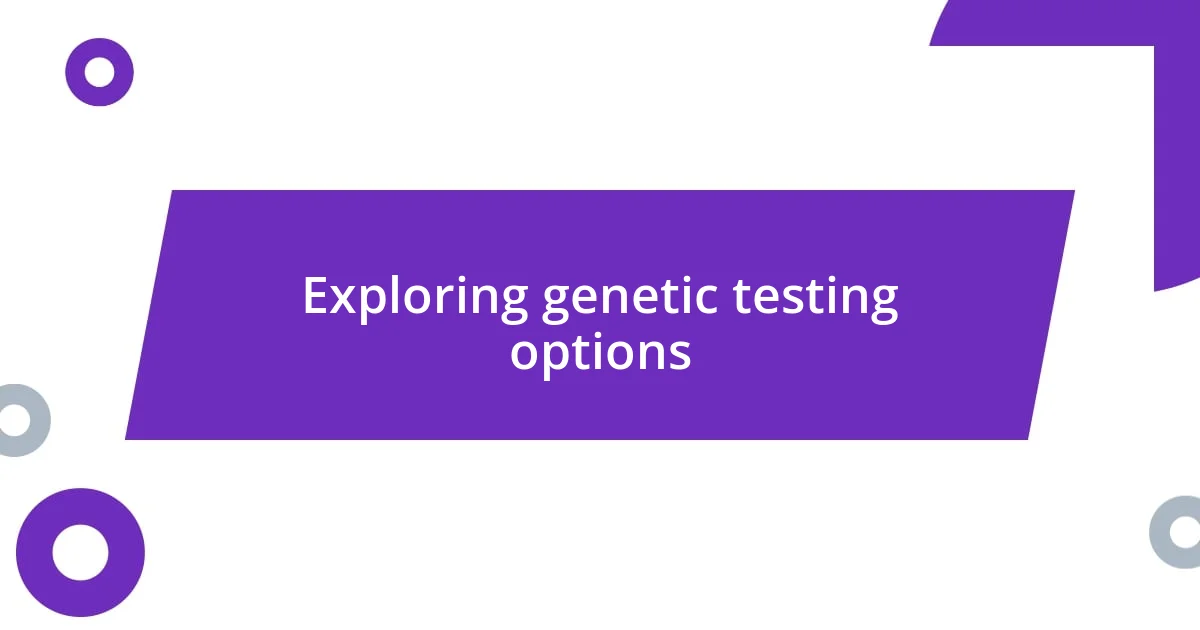
Exploring genetic testing options
Exploring genetic testing options has become a crucial step for many who seek a deeper understanding of their health and ancestry. Recently, I decided to explore my own genetic background and found some unexpected connections to my heritage. That journey opened a door to not just my family’s history but also to potential health risks I had never considered. It was an enlightening experience that made me realize how powerful genetic testing can be.
There are several genetic testing options available today that cater to different needs, including:
- Ancestry Testing: Discover your ethnic roots and family lineage.
- Health Risk Assessments: Identify genetic predispositions to certain diseases.
- Carrier Screening: Check if you’re a carrier for genetic conditions, useful for family planning.
- Whole Genome Sequencing: Gain comprehensive insights by analyzing your entire genome.
Each option presents unique insights, and I believe that understanding these can empower individuals to make informed health decisions that resonate with their personal stories.
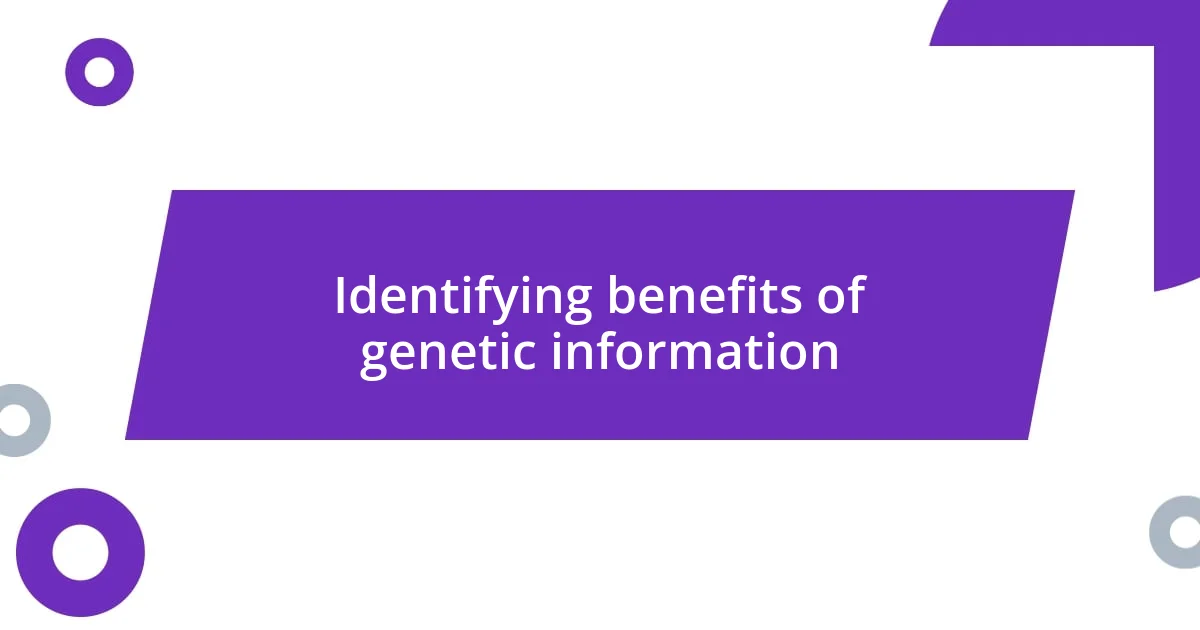
Identifying benefits of genetic information
Identifying the benefits of genetic information opens up a world of possibilities. One of the most significant advantages I’ve seen is the early detection of potential health issues. For example, I once read about someone who learned through genetic testing that they had a higher susceptibility to certain cancers. Armed with that knowledge, they were able to take proactive steps, like increased screenings and lifestyle changes, which likely contributed to better health outcomes. Isn’t it incredible how such information can lead to preventive measures?
Another compelling benefit of genetic information is its role in personalized medicine. I remember attending a seminar where a doctor described how they tailored treatment plans based on a patient’s unique genetic makeup. This means no more one-size-fits-all approaches to treatment. Instead, therapies could be customized, which not only enhances effectiveness but also minimizes side effects. Hearing this made me realize just how transformative precision medicine can be for individuals, particularly those living with chronic conditions.
Lastly, genetic information can be a game changer in understanding one’s ancestry. After digging into my own genetic tests, I felt a profound connection to distant cultures I had only read about. It’s fascinating how these connections can spark a sense of identity and belonging. Knowing more about where I come from deepens my appreciation for my roots and even influences how I view my place in the world.
| Benefit | Explanation |
|---|---|
| Early Health Detection | Identifies potential risks for diseases, allowing for proactive healthcare measures. |
| Personalized Medicine | Tailors treatment plans to individuals’ genetic profiles, improving effectiveness and reducing side effects. |
| Ancestry Insights | Explores ethnic backgrounds and family lineage, fostering a deeper connection to one’s heritage. |
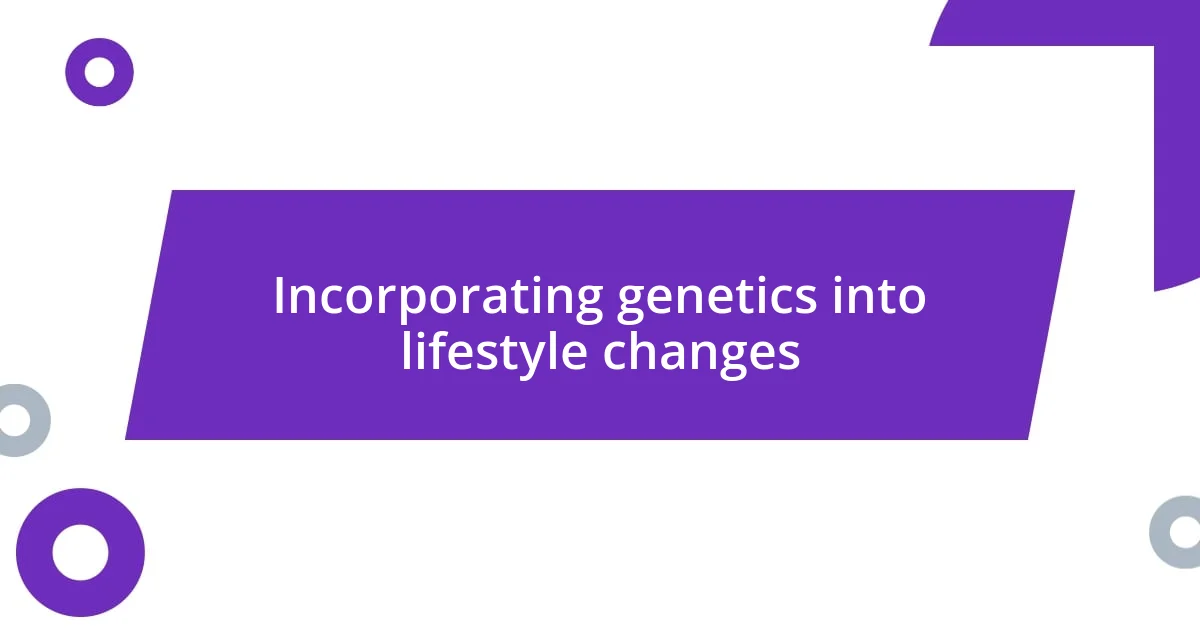
Incorporating genetics into lifestyle changes
Incorporating genetics into lifestyle changes can be a transformative journey. After learning about my genetic predispositions, I found myself reassessing my daily habits to align more closely with insights from my tests. For instance, I discovered a higher likelihood of lactose intolerance, so I swapped my morning yogurt for almond milk. Have you ever made a small switch based on what you learned about yourself?
Understanding my genetic makeup also influenced my exercise routine. I realized I had a genetic variant that affects how my body metabolizes caffeine, which meant I needed to approach stamina-building workouts differently. This added an exciting challenge to my fitness regimen, and I began to explore activities that suited my unique genetic profile, leading to greater enjoyment and better results. Isn’t it fascinating how a little DNA information can reshape the way we live?
Moreover, learning about potential health risks motivated me to adopt a more nutritious diet. I remember standing in the grocery store, actively choosing kale over chips, feeling empowered by my newfound knowledge. Instead of viewing these changes as limitations, I embraced them as opportunities for a healthier lifestyle. How does knowing your genetic risks influence your decisions? For me, it’s about making choices that honor my body’s unique needs.
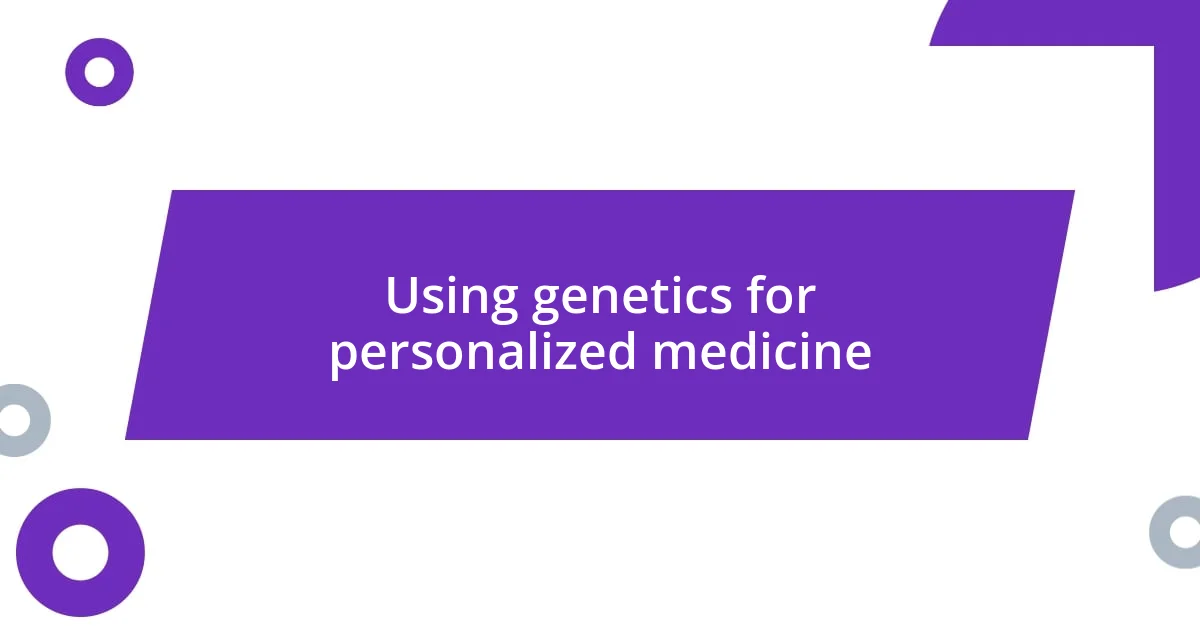
Using genetics for personalized medicine
Using genetics for personalized medicine extends beyond mere testing; it deeply impacts the way I view my health and wellness journey. A while back, I consulted with a healthcare provider who utilized my genetic data to help devise a customized treatment plan for a chronic condition I’ve managed for years. It was eye-opening to realize that what worked for someone else might not be effective for me. Do you ever wonder how much of your treatment could be tailored just for you?
I recall a particular moment when my doctor reviewed my genetic markers related to medication response. We discovered that I metabolize certain drugs differently – information that could potentially spare me from experiencing adverse effects. As I listened, I felt a wave of relief. How empowering is it to know that the treatment you receive can be finely tuned to your individual biology? It transforms a daunting experience into a collaborative effort between my health journey and my healthcare team.
Moreover, this approach doesn’t just revolutionize treatment; it cultivates a sense of ownership over my healthcare decisions. After learning about my genetic predispositions, I felt inspired to actively participate in discussions about my treatment options. It’s like embarking on a personal expedition through the landscape of my health. I find myself asking, “What can I do with this information?” rather than feeling overwhelmed by potential risks. This sense of control ultimately redefines my relationship with healthcare, allowing me to navigate my path with confidence and clarity.
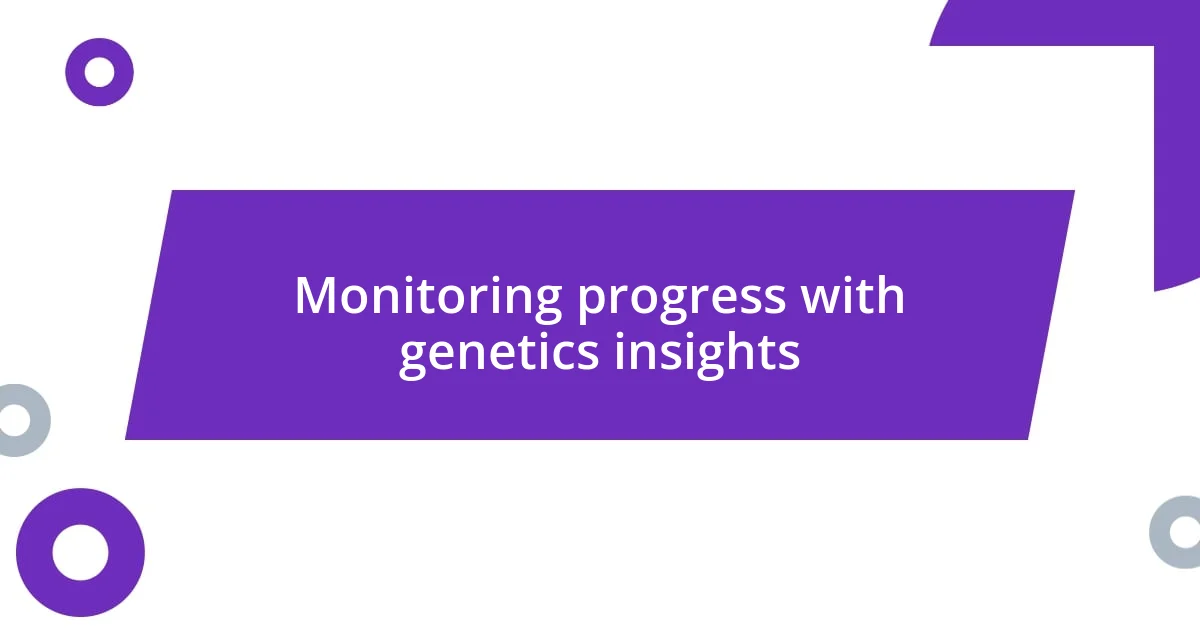
Monitoring progress with genetics insights
Monitoring progress with genetic insights is a dynamic aspect of my health journey. I regularly track changes in my physical performance and overall well-being, comparing them to my genetic background. For instance, after adjusting my workouts based on my genetic predispositions, I noticed improved endurance, which sparked my curiosity: how much further could I go if I stayed attuned to my DNA data?
Keeping a journal to document these changes has been immensely helpful. I find it incredibly empowering to look back and see how the choices I’ve made directly correlate with my genetic insights. Sometimes, I’ll jot down how I felt during workouts or how certain foods affected my energy levels. It’s almost like having a conversation with my past self. Have you ever reflected on how your habits are connected to your body’s unique needs?
As I make these observations, I can’t help but feel a sense of connection to my genetic heritage. It’s fascinating to realize that each positive change is not just a win for my health but a step toward honoring my family’s history. This ongoing process transforms my approach to health into an enriching story, where I’m learning more about myself every day. Isn’t it rewarding to see your journey unfold in such a personal way?
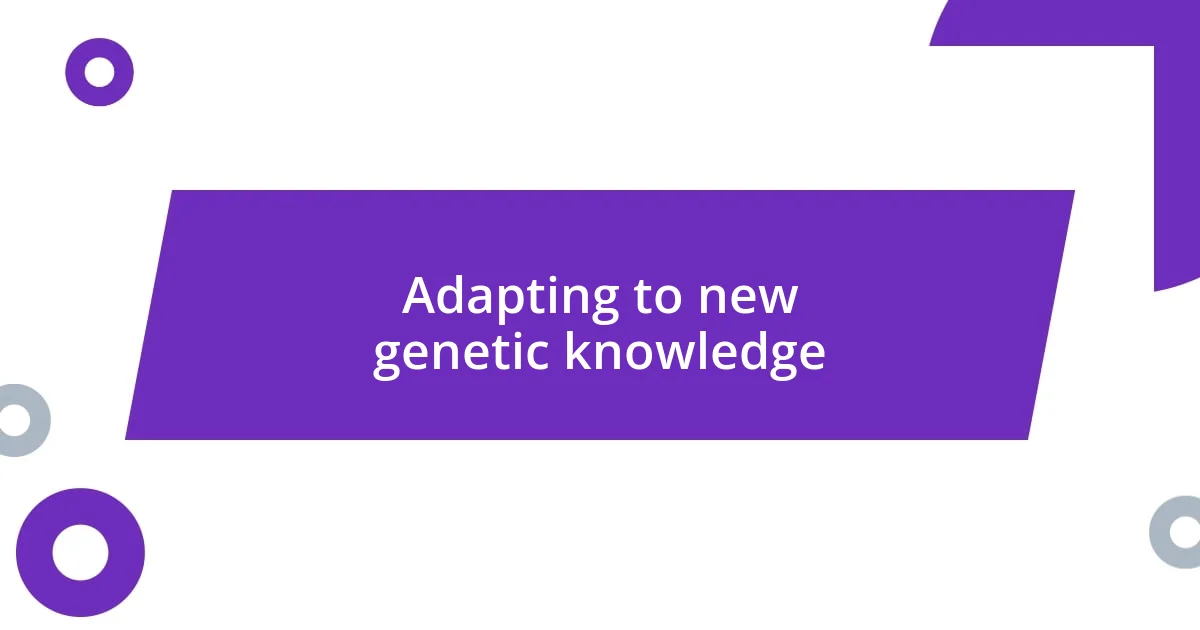
Adapting to new genetic knowledge
Adapting to new genetic knowledge isn’t just about data; it’s a personal evolution. I remember a time when I felt overwhelmed by the flood of genetic information available. It seemed daunting at first, but then I realized that this was my unique roadmap to better health. Have you ever felt the fear of the unknown, only to find empowerment in understanding? It’s that deeper insight that allows me to embrace this knowledge rather than shy away from it.
One of the pivotal moments for me was when I started to see genetics as a tool for proactive health management. There was a point when I learned about a genetic predisposition to higher cholesterol levels. Instead of feeling anxious, I felt motivated to make changes in my diet and lifestyle. It was like uncovering a hidden chapter of my health story, prompting me to ask, “What can I do today to write a better ending?” This newfound perspective granted me the courage to prioritize health screenings and clean up my eating habits.
Moreover, I often find myself discussing these genetic revelations with friends and family. Sharing my journey helped them understand the importance of genetic knowledge for their own lives. Conversations shifted from fear to curiosity, with questions like, “How can I leverage my own genetic insights for better health?” Together, we discovered that knowledge truly is power, and adapting to our genetic information turned into a facet of our collective journey towards wellness. Each discussion deepens our understanding and reinforces the idea that we’re not alone in this exploration.


